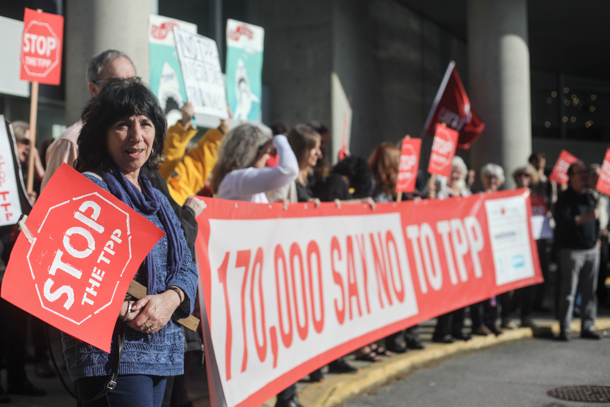The Council of Canadians is calling out an independent review of a federal government study that found the Trans Pacific Partnership (TPP) trade agreement would give a $4.3-billion boost to the economy by 2040.
The economic impact assessment, released Monday, also found that staying out of the controversial trade deal with 11 other Pacific Rim nations would reduce GDP by $5.3 billion by 2040. (Canada’s GDP is currently about $2 trillion.)
Sujata Dey, trade campaigner with the council, noted the assessment was conducted by the Office of the Chief Economist within Global Affairs Canada, the department responsible for negotiating the TPP.
“It’s a very strange situation, your own department doing your own economic study,” she said, noting the department has a vested interest in promoting its own work.
The deal should be reviewed by the independent Parliamentary Budget Officer, she said.
The TPP agreement was reached by the former Conservative government last October and signed by the Liberal government early this year. It hasn’t been ratified by Parliament, and the Liberals have not said if they will support the agreement.
The Global Affairs impact assessment offers a largely positive view.
“Joining the TPP would provide a net advantage to Canada resulting from increased market access and greater regional economic integration with Asia-Pacific countries,” the study from Global Affairs said.
Imports from new free trade partner countries would rise by $3.6 billion, the study found, while Canadian exports to those countries would increase by $2.2 billion.
Labour groups have also expressed concern over how the deal would affect Canadians working in the manufacturing and agriculture sectors.
Dey also complained the forecast model used in the study — the “dynamic computable general equilibrium model”— is flawed.
The model has been criticized for relying on too many assumptions and failing to reflect the potential impact of future government policy choices and economic changes.
Dey charged that the model’s assumptions are based on the idea that “all neoliberalism is good” and taints the study. She called it a PR exercise.
Dey said the study does not acknowledge the cost of compensation for Canadian farmers who would lose protection from imports. While the deal could benefit Canada with a $4.3 billion increase in GDP, about the same amount of money would be paid out to farmers for their losses.
And the study doesn’t take into account environmental, human rights, health or Indigenous concerns, Dey said. It considers financial growth but not the impact on employment, she added.
The study also doesn’t deal with concerns that copyright provisions and dispute resolution mechanisms that could open the government to lawsuits from foreign companies.
A study by the Australian government’s independent Productivity Commission identified both those areas as issues.
“There are provisions in the TPP that the Commission has previously flagged as of questionable benefit,” it reported. “These include term of copyright and the investor state dispute settlement elements.”
Dey said other studies from the World Bank and the C.D. Howe Institute show more modest economic gains for Canada than the federal study.
The New Democrats issued a release saying the study shows the TPP will hamper the auto sector, which has already been “hammered” by bad trade deals.
But the department’s study found that if the deal goes ahead without Canada, the auto sector will be hit even harder.
The Conservatives, who are pressing Canada to ratify the agreement, issued a release praising the deal.
Global Affairs Canada did not have a formal response to questions about the study and did not grant a request to speak to International Trade Minister Chrystia Freeland on Monday. ![]()















Tyee Commenting Guidelines
Comments that violate guidelines risk being deleted, and violations may result in a temporary or permanent user ban. Maintain the spirit of good conversation to stay in the discussion.
*Please note The Tyee is not a forum for spreading misinformation about COVID-19, denying its existence or minimizing its risk to public health.
Do:
Do not: